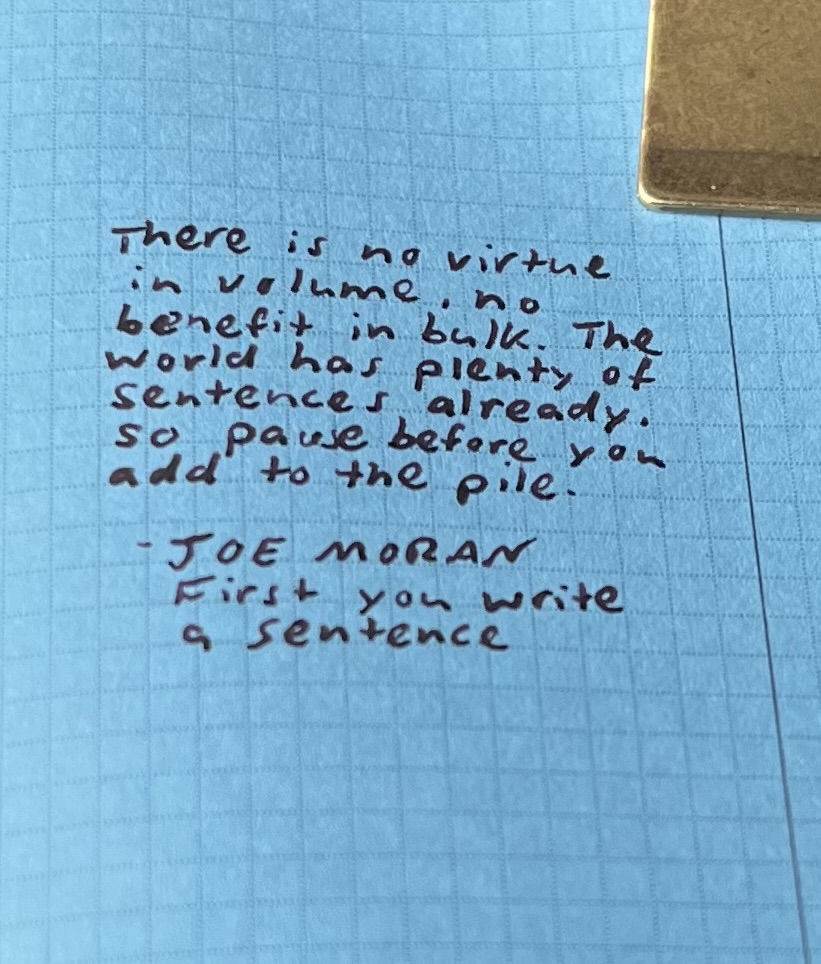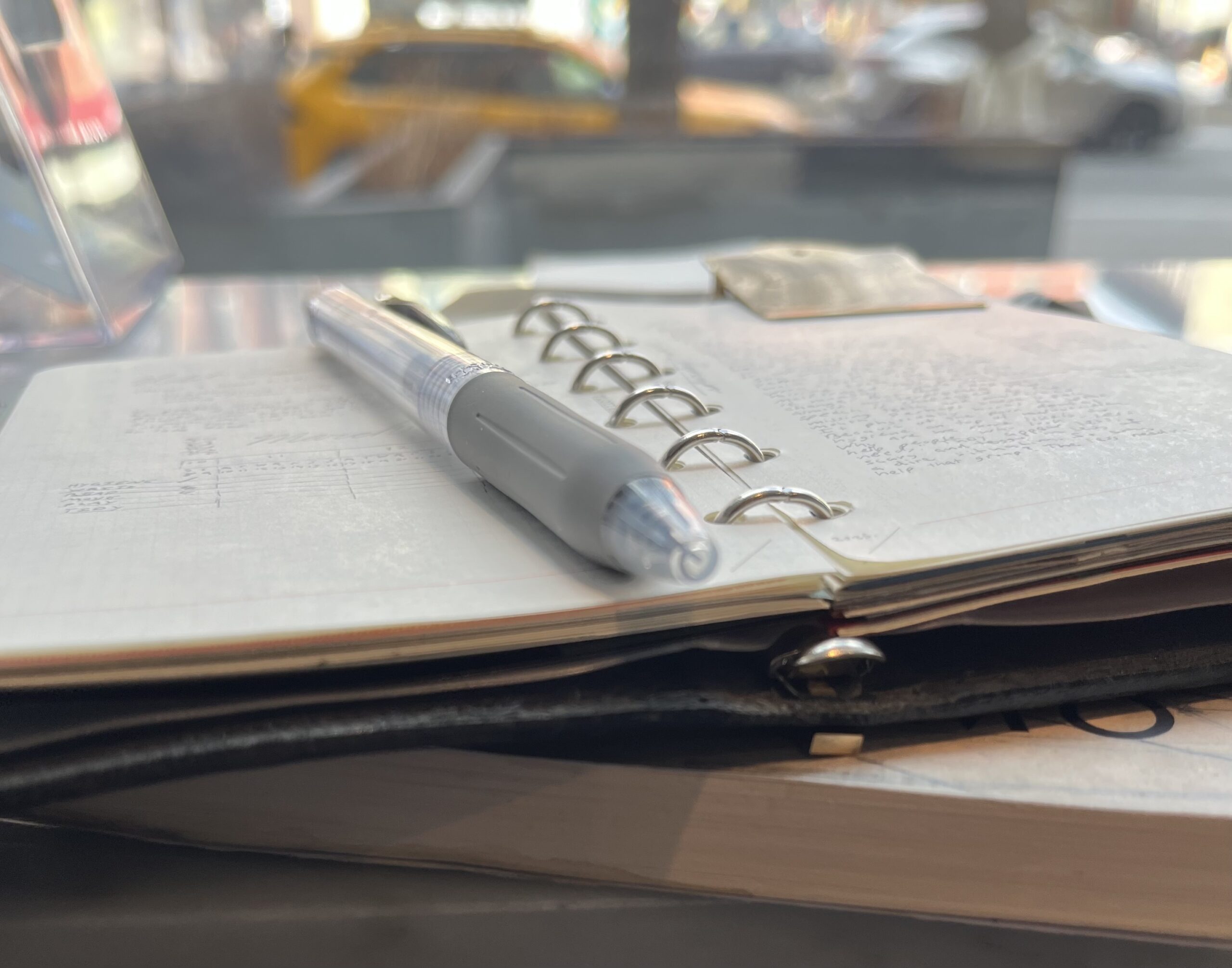Reflections on a Low Spend Habit
When I don’t set guidelines for myself, I tend to mindlessly consume products. I’ve tried nearly every new note-taking app, notebook system, and e-ink tablet. I work with words and information, so my notes are important to me. Still, that doesn’t mean I should buy all note-taking products with (baseless) claims to massively improve my life. Such claims manipulate feelings and do not reflect rigorous evidence.
One of my favorite examples of this is a slogan from Recess, an adaptogen drink: we canned a feeling. While I enjoy many of these drinks, they don’t have a major impact on how I feel, not in the long-term. Perhaps that’s not their claim, but I need the tools I use to be integrated into long-lasting, sustainable systems, not short term fixes. I’m trying to move past that phase of my life. And, given these uncertain times, I have to.
We need very few things to stay alive. My favorite shows are contests of survival in uncivilized spaces, like Survivor and Alone. These shows help me conceptualize that, to live, in the most literal sense, I only need water, fire, food, and shelter. In the book Reasons to Stay Alive, Matt Haig reminds us that the point of marketing is to keep us feeling anxious, uncomfortable, and wanting:
To be calm becomes a kind of revolutionary act. To be happy with your own nonupgraded existence. To be comfortable with our messy, human selves, would not be good for business.
-Matt Haig
Like many people, I’ve tried to buy things to fix painpoints in my life. E-ink is one of those themes that creeps into my thoughts as the fix to my frustration with staring at screens for most of the day and managing physical paper. Ironically, I started typing this on the Onyx Boox Palma, an e-ink device that I sometimes use as a digital typewriter. It is the only e-ink device that I currently own. In brief, it’s an okay, relatively inexpensive, little machine that I bought in early 2024. This year, I’m focusing on mindful spending. I’m planning to buy much less than in prior years.

One of my favorite quotes from Joe Moran’s book, First You Write a Sentence. “There is no virtue in volume, no benefit in bulk. The world has plenty of sentences already, so pause before you add to the pile.”
My goal is to use simple, sustainable systems to help me maintain mindful focus, attending to what truly matters to me (and not spending all of my money). Below, I discuss some changes I’m making and basic guidelines for my low spend year and, hopefully, a low spend lifestyle.
Guidelines to Maintaining a Low Spend Habit
There are two basic guidelines to a low spend lifestyle. First, the goal is to buy nothing that is completely new. Essentially, this means I should not buy into new systems. For example, I am not purchasing new notebook covers or systems; note-taking app subscriptions; electronic devices; pens; clothing; or anything else.
The second aspect of this the low spend habit is upkeep. New clothes are not an allowable expense for me, but I will replace those that are too damaged for repair or otherwise uncomfortable to wear. While I am not buying new notebook covers, I will buy paper as needed. I use refillable notebook systems, like Plotter, Traveler’s notebook, and Roterfaden. As I already own a lot of paper and write in tiny font, my writing tools will last for a long while.
A challenge to this is that, well, I like to buy new things. Buying something new gives me the false hope that it will majorly improve my life, that my problems will fade into the background, and I will consistently feel a sense of accomplishment. But I am resisting the urge to fall into that and decidedly not buying anything new (to me) this year. Instead of reviewing new items, I’m focusing on refining workflows, developing focus-flows, and exploring interesting concepts. Maybe, to get real value out of our tools, we should fine-tune the tools we already own, not amass new items for old problems.
Recent Changes to Support Low Spend
To practice this low spend habit, I’m committing to honing the tools I already have. My notebook use is one of my best examples of this. A few years back, I made the claim that notebooks, even in the long run, are cheaper than e-ink tablets. But I am learning they can be similarly expensive if you allow it, especially leather notebook covers. This year, I am trying to commit to buying no more notebook covers. My goal is to use that which I already own and only buy for upkeep, as I mentioned in the “guidelines” section above.

My small, six-ring binder that I like to keep with me.
Refillable notebooks and binders are helpful for this kind of plan. I use a Traveler’s notebook for keeping an analog copy of book notes and Plotter binders for daily notes and reflective journaling. Plotter’s paper refills come in 2 mm grid, which is just tiny enough for me to legibly write (and sometimes ramble) without using too much space. On a good week, I can get by with a single notebook page, front and back. On a bad (or particularly eventful) week, when I am pouring my mind on the page, I might use around seven to ten pages. In either case, the tiny handwriting that the small grid accommodates is economical. Taken together, this means lower spending on materials for writing and note-taking tools.
Potential Benefits of a Low Spend Habit
My hope is that maintaining a low spend habit will save time. There was a period in my life when I would lease cars on a whim, but that was before I ran into medical emergencies that can cost up to nearly a third of my annual salary. And moving fees in Manhattan are not far from that cost. Experiencing how these types of expenses can wreck my bank account, I’ve learned (the hard way) to maintain a comfortable emergency fund. The drawback to this is that I now evaluate every expense. More accurately, I have a tendency to ruminate, to obsess over the small details of purchases that may not matter much in the long run. I have talked with my partner so often about buying electronics that he offers to buy them for me, probably just to shut me up. The decision I’m making to spend very little on nonessential purchases will help curb some of this runimantive thinking, ultimately saving me (and others in my life) time.
The obvious goal of a low spend lifestyle is to save money. When spending less, as long as we make the same amount of money or more, we have more cash and give in less to consumerist complusions. Perhaps more importantly, with this low spend lifestyle, I will have the mental space to focus on writing. Actual writing, not just managing so-called writing tools and overcomplicated systems. In removing clutter, we disinter the mental room to write.
Something important for me to understand is that, although I want to, I don’t have to increase my writing frequency or creative output. In maintaining a low spend habit, I’m reflecting on the concept of enough. Marketing strategies often push the idea that we need more — save more money by buying these, save more time by buying that, feel more happy with this, and so on. Even I have just argued that practicing a low spend habit will save time and money, but perhaps we need more of neither. Perhaps all we need from a low spend habit is to understand that what we already have is enough.
I’ve been meditating on Zach Bryan’s poem, Fear and Fridays. As I am keenly aware of time passing and with it, myself aging, this line resonates with me.
I do not and will not fear tomorrow because I feel as though today has been enough.
Every year, calendar and birthday, I berate myself for not having done more, not having done enough. But what if I already have? Maybe we need not set astronomically high expectations for ourselves and just live a life that feels meaningful each day. I hope that is enough.
- For a deeper dive into this topic, see this academic review on minimalist lifestyles and wellbeing, this empirical study on minimalism and health, and this article on more options and poorer focus.
- If you found value in this writing and want to say thanks, here are a few ways to support the blog:
- Chat with me directly and send feedback, questions, or article requests to my new email: thoughts at emilyhokett.blog.
- Find more of my writing on Substack, Medium and here at emilyhokett.blog.
- Buy me a tea🍵 to support the maintenance of the blog.
Take care. Talk soon.